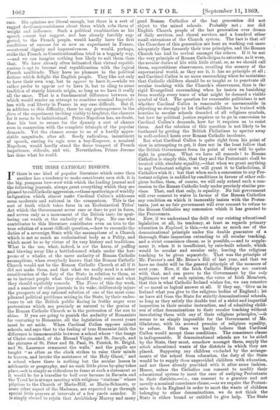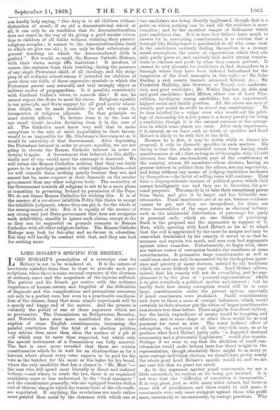THE IRISH CATHOLIC BISHOPS.
I F there is one kind of popular literature which more than
another has a tendency to make considerate men sick, it is the big, pompous bow-wow with which the leading journal and the following journals, always greet everything which they are pleased to call Catholic aggression,—those sputterings of worldly indignation which almost make Cardinal Cullen's addresses seem moderate and rational in the comparison. This is the sort of froth which takes form in an Ecclesiastical Titles' Act which the Government never care or dare to put in force, and serves only as a monument of the British taste for sput- tering out wrath at the audacity of the Pope. No one who contributes to this literature contributes even an iota to the true solution of a most difficult question,—how to reconcile the duties of a sovereign State with the assumptions of a Church which is not so much an ecclesiastical body as a Polity, and which must be so by virtue of its very history and traditions. What is the use, what, indeed, is not the harm, of puffing and blowing away like a bottled-nosed whale under the har- poons of a whaler, at the mere audacity of Roman Catholic assumptions, when everybody knows that the Roman Catholic Church would not be the Roman Catholic Church at all if it did not make them, and that what we really need is a sober consideration of the duty of the State in relation to them, sci as to instruct people what they should firmly resist and what they should equitably concede. The Times of this day week, and a number of other journals in its wake, deliberately injure the prospects of any rational solution of one of the most com- plicated political problems arising in the State, by their endea- vours to set the British public fizzing in frothy anger over pretensions which are precisely as natural to the genius of the Roman Catholic Church as is the pretension of the sun to shine. If you are going to punish the audacity of Romanists for venturing to Romanize, all the legislation of recent years must be set aside. When Cardinal Cullen opposes mixed schools, and says that to the feeling of true Romanist faith the difference is immeasurable between a school where "the image of Christ crucified, of the Blessed Virgin and St. Joseph, and the pictures of St. Peter and St. Paul, St. Patrick, St. Brigid, and St. Laurence ornament the walls," and the pupils are taught "as often as the clock strikes to raise their minds to heaven, and invoke the assistance of the Holy Ghost," and a school where there is nothing but the secular lesson in arithmetic or geography, and no such little pious by-play takes place,—it is simply as ridiculous to fume at such a statement as it would be for a traveller to boil over because in Bavaria and the Tyrol he is always meeting with religious "stations" where pilgrims to the Church of Maria-Hilf, or Maria-Schmerz, or some other aspect of the Madonna, are expected to go through special little prayers at intervals of a few yards asunder. It is simply absurd to rejoin that Archbishop Murray and many
good Roman Catholics of the last generation did not object to the mixed schools. Probably not ; nor did English Church people of the last generation ever dream of daily services, and choral services, and a hundred other small extensions of the Church system. The fact is that alt the Churches of this generation are bent on working out more- adequately than formerly their true principles, and the Roman. Church has had its revival amongst the others. If it be not the very principle of Roman Catholici,sm to saturate, as it were, the secular duties of life with little ritual, or, as we should call them, superstitious observances, recalling the scenery of the supernatural world, as they see it, it has no principle at all ; and Cardinal Cullen is no more encroaching when he maintains. that Catholic children should be so taught as to penetrate all secular teaching with the Church's observances, than is the- rigid Evangelical encroaching when he insists on banishing from worship every trace of what might be deemed a visible symbol of God. The question for reasonable politicians is not whether Cardinal Cullen is reasonable or unreasonable in objecting so strongly to let Catholic children be trained with. heretics in secular schools denuded of all religious symbols, but how far political justice requires us to go in concession to- Cardinal Cullen's demands, how far it requires us to resist them. And the solution of this question is not likely to be furthered by getting the British Philistines to sputter away in well-ordered hosts over Roman Catholic insolence.
But what Cardinal Cullen is quite right from his point of view in attempting to get, it does not in the least follow that the British Government from its point of view will be quite- right in granting. What we have all concedel to Roman. Catholics is simply this, that they and the Protestants shall be- treated with absolute equality,—that when we grant anything- to any Protestant religion we will grant it to Catholicism, if Catholics wish it ; but that when such a concession to any Pro- testant religion is saddled by conditions in favour of other reli- gious bodies, then, of course, we will only extend such a con- cession to the Roman Catholic body under precisely similar pro- visos. That, and that only, is equality. No fair government will ever consent to waive in favour of the Roman Catholics any condition on which it inexorably insists with the Protes- tants, just as no fair government will ever consent to refuse to- the Roman Catholics any concession which it has granted to- the Protestants.
Now, if we understand the drift of our existing educational. legislation at all, its tendency, at least as regards primary- education in England, is this,—to make as much use of the denominational principle under the double guarantee of a. thorough State inspection extending to all secular teaching, and a strict conscience clause, as is possible,—and to supple- ment it, when it is insufficient, by rate-built schools, which would be secular and secular only, leaving the religious teaching to be given separately. That was the principle of Mr. Forster's and Mr. Bruce's Bill of last year, and that we have no doubt will be the general principle of the measure of next year. Now, if the Irish Catholic Bishops are content with that, and can prove to the Government by the only legitimate test of such opinion, the votes of Irish Members, that this is what Catholic Ireland wishes for, we can conceive of no moral or logical answer at all. If they say, Give us in. Ireland what you give to the religious bodies of England ; let us have aid from the State for strictly denominational schools, so long as they satisfy the double test of a strict and impartial inspection in their secular instruction, and of admitting child- ren of other denominations to their secular teaching without inoculating them with any of their religious principles,'—it seems to us simply impossible for the Government of Mr. Gladstone, with its avowed promise of religious equality, to refuse. But then we hardly believe that Cardinal Cullen would accept these conditions. The conscience clause is indispensable. If denominational schools are to be aided by the State, they must, somehow amongst them, supply the- whole educational wants of the districts in which they are placed. Supposing any children excluded by the arrange- ments of the school from education, the duty of the State- would be to supply those unprovided children with education, and not those already provided with it after some fashion. Hence, unless the Catholics can consent to modify their- educational system to meet the case of outlying Protestants in their districts,—i.e., can consent to a genuine and not, merely a nominal conscience clause,—as we require the Protest- ants to do in England in order to meet the wants of children belonging to other denominations, we do not think the State is either bound or entitled to give help. The State can hardly help saying, "Our duty is to all children withou5 distinction of creed ; if we aid a denominational school at all, it can only be on condition that its denominationalism does not stand in the way of its giving a good secular educa- tion to children of all faiths without violating their parents' religions scruples ; it cannot be the denominationalism itself to which we give our aid ; it can only be that substratum of general teaching on which the denominational faith is grafted." But would, or could, the Roman Catholic Bishops, with their views, accept Ms limitation ? It involves, of course, the omission from their teaching, during the presence of any single Protestant child, of all theology, and the strip- ping of all ordinary school-rooms, if intended for children of more than one faith, of those expressive symbols to which the Protestant parent may naturally and very strongly object as indirect modes of propagandism. Is it possible, consistently with Cardinal Cullen's views, to concede this ? If not, he cannot expect the State to meet his views. Religious equality is our principle, and State support for all good secular educa- tion which can be made available for all who want it, irrespective of religious adjuncts. To that principle we must strictly adhere. To deviate from it in the case of one creed would involve deviating from it in the case of all. The Catholics must know very well that to make exceptions to the rule of strict impartiality in their favour, would be as impossible for Mr. Gladstone's Government as it would be unworthy of that Government. After depressing the Protestant interest in order to secure equality, we are not going to elevate the Roman Catholic interest in order to destroy it again. A Government that behaved in. this shilly- shally sort of way would meet the contempt it deserved. We will refuse the Roman Catholics nothing that they can fairly prove to be a privilege granted to other religious bodies,—but we will concede them nothing merely because they are, and cannot but be, more exigeant in their demands on the secular government than any other religious body. The neutrality of the Government towards all religions is not to be a mere phase of transition to governing Ireland by permission of the Pope. We do not blame Roman Catholics for wishing this. It is of the essence of a soi-disant infallible Polity like theirs to accept the infallible judgment, where they can get it, for the whole of the arrangements of life. But it is equally of the essence of any strong and just State-government that does not recognize such infallibility, steadily to ignore such claims, except so far as they can be supported on grounds common to Roman Catholics with all other religious bodies. The Roman Catholic Bishops may look for fair-play and no favour in education. But they will hardly be content with that, and they can look for nothing more.































 Previous page
Previous page